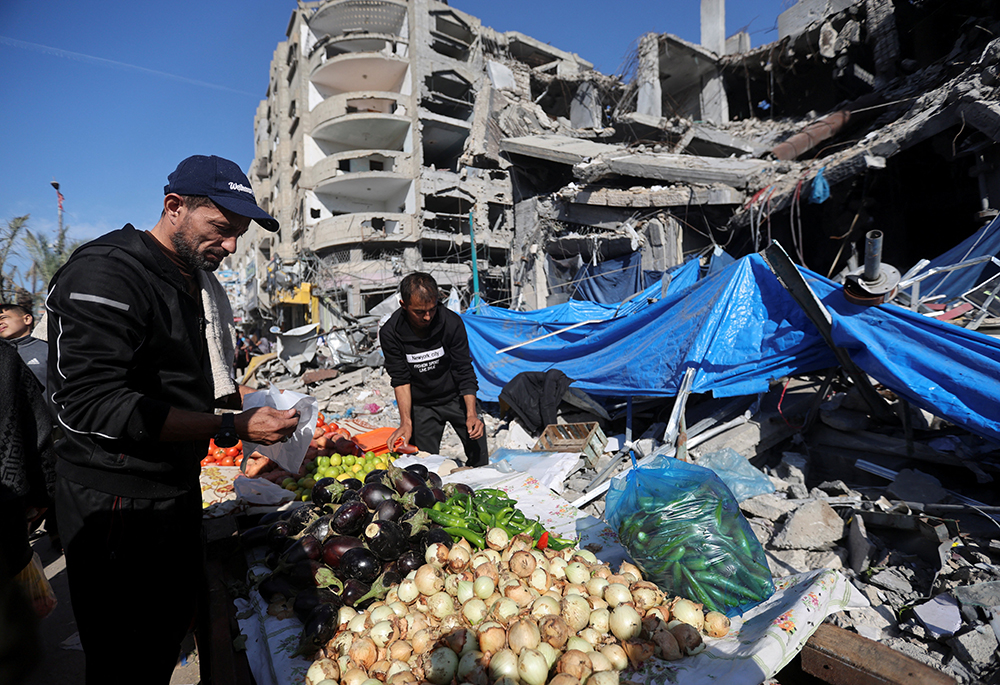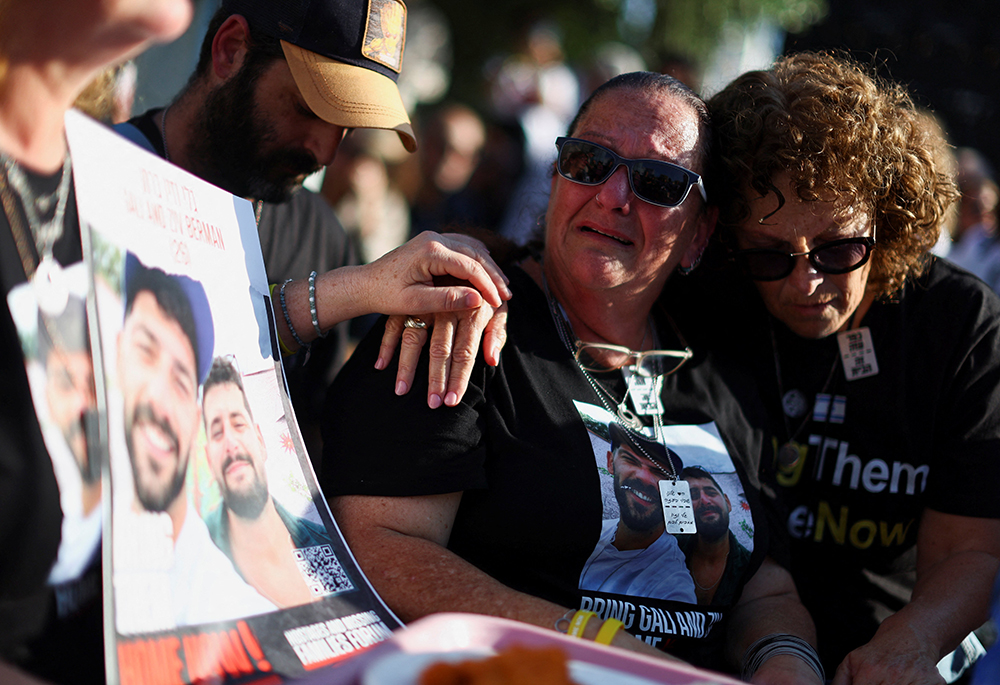
A Palestinian vendor prepares his products in an open-air market in the Nuseirat refugee camp in the central Gaza Strip Nov. 30 near the ruins of houses and buildings destroyed in Israeli airstrikes during the Hamas-Israel conflict, amid a temporary truce between Hamas and Israel. (OSV News/Reuters/Ibraheem Abu Mustafa)
The ceasefire between Israel and Hamas expired and the fighting began again. There are still Israeli hostages being held by Hamas and hopes that they may still be alive are dimming. There are hundreds of thousands of Palestinian hostages of Hamas. Their fate, too, is imperiled.
It is difficult enough for those of us who hold no civil authority to figure out how to respond to the tragedy. We should all pray for those who must try and forge public policy in this situation. There are no good options, only bad and worse ones.
When he returned from the synod in Rome, Chicago Cardinal Blase Cupich went to Shabbat services at Anshe Emet synagogue in Chicago. His remarks evidenced his own and the Catholic Church's solidarity with the Jewish people for whom the attacks of Oct. 7 were profoundly traumatic. And, as is proper and necessary for a Christian pastor, he voiced the hope that peace might come and that more innocent blood would not be shed on either side of the border.
Cupich is a man who chooses his words carefully. He said, "The brutal attack of Hamas militants which desecrated and took the lives of more than 1,000 Israelis, along with the kidnapping of 250 hostages on Oct. 7 has, as you know too well, left Jews in Israel, Chicago, and throughout the world in a deep state of shock and mourning." The verb "desecrated" jumps off the page. What was done to the people of Israel by the Hamas terrorists was not just killing, not just murder, it was desecration, a violation of the sacred.

People react during a demonstration in Tel Aviv, Israel, Nov. 30 organized by mothers of hostages taken during the deadly Oct. 7 attack by Palestinian Islamist group Hamas. (OSV News/Reuters/Athit Perawongmetha)
His remarks put me in mind of the powerful words Pope Benedict XVI spoke when he went to Auschwitz. His visit, like that of his predecessor Pope John Paul II, was remarkable. First a son of Poland and then a son of Germany, both become bishop of Rome, standing in that place where the purest evil the world has known was committed. Benedict said:
The rulers of the Third Reich wanted to crush the entire Jewish people, to cancel it from the register of the peoples of the earth. Thus the words of the Psalm: "We are being killed, accounted as sheep for the slaughter" were fulfilled in a terrifying way. Deep down, those vicious criminals, by wiping out this people, wanted to kill the God who called Abraham, who spoke on Sinai and laid down principles to serve as a guide for mankind, principles that are eternally valid. If this people, by its very existence, was a witness to the God who spoke to humanity and took us to himself, then that God finally had to die and power had to belong to man alone — to those men, who thought that by force they had made themselves masters of the world. By destroying Israel, by the Shoah, they ultimately wanted to tear up the taproot of the Christian faith and to replace it with a faith of their own invention: faith in the rule of man, the rule of the powerful.
The Jews, so long falsely accused of deicide, were, in Benedict's brilliant analysis, themselves the object of deicide. The Nazis, remember, did not want to kill this Jew who was in the way of their conquests or that Jew who had fought against them in the battle for the Warsaw ghetto. The goal was extermination, to kill all the Jews per se and completely. Even those Jews who might be useful to the regime had to be killed.
What was most appalling about the terrorist attacks on Oct. 7 was this, the intention to desecrate. Civilians were not killed by accident, but by design, and that design continues. The death of a Palestinian civilian from an Israeli airstrike is just as much of a loss as the death of an Israeli civilian on Oct. 7. The one is also an act of desecration because of the intention of the perpetrators. Intent also explains why Hamas' goals are genocidal and Israel's are not.
CNN reported, shortly after the attacks, a senior Hamas leader, Ghazi Hamad, told a Lebanese TV channel: "We will do this again and again." He said the attack was "just the first time, and there will be a second, a third, a fourth." No one should be surprised by this. Article 7 of the Hamas Covenant pledges the organization to the extermination of the Jews. The chant "from the river to the sea" is a military strategy, not idle chatter.
Article 13 that is equally problematic. It states: "Initiatives, and so-called peaceful solutions and international conferences, are in contradiction to the principles of the Islamic Resistance Movement." Those who call on Israel to make peace must reckon with this explicit pledge in Hamas' foundational document rejecting attempts at peace. How do you make peace with someone who has, a priori, rejected peace as an outcome?
We should never analogize to World War II too easily, but here it is precise. The thing Winston Churchill understood, and Neville Chamberlain did not, is that there was no negotiating with a messianist like Hitler. We cannot know how history might have been different if Chamberlain had understood this in 1938 before Munich, or in 1936, before the German army marched into the Rhineland. How many millions of lives might have been saved?
I hope the Israeli government does everything in its power to minimize civilian casualties in Gaza. Certainly, it is in their interest to do so even while Hamas insists on trying to keep civilians in harm's way. (Journalists are right to ask "Cui bono?" in every situation, even the most gruesome ones.) Still, it is a special kind of evil that places weapons stashes and a command center in a hospital as Hamas has done. On whose hands is the blood of those who died at that hospital?
Those who condemn Israel's assault in Gaza must ask themselves if they are content leaving Hamas in power there. Or, do they see a different way to remove Hamas besides war?
The primary beneficiaries of the defeat of Hamas will not be the people of Israel but the people of Gaza. Only when they are rid of Hamas can a genuine effort at peace and the erection of a Palestinian state become possible. I hope Israel can eliminate Hamas with as few civilian casualties as possible. Those, like Sen. Lindsey Graham, who do not care about the number of casualties in Gaza — "Level the place," he said — deny the universal dignity of all people. So do those who try and equate what Israel is doing with what Hamas did and hopes to do again.








